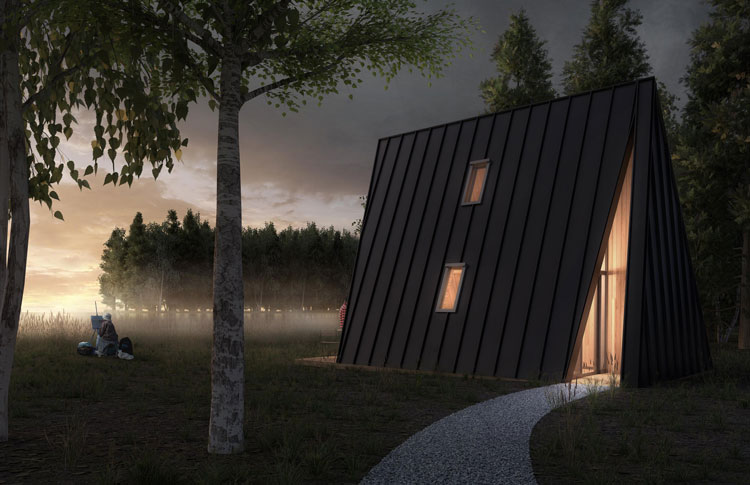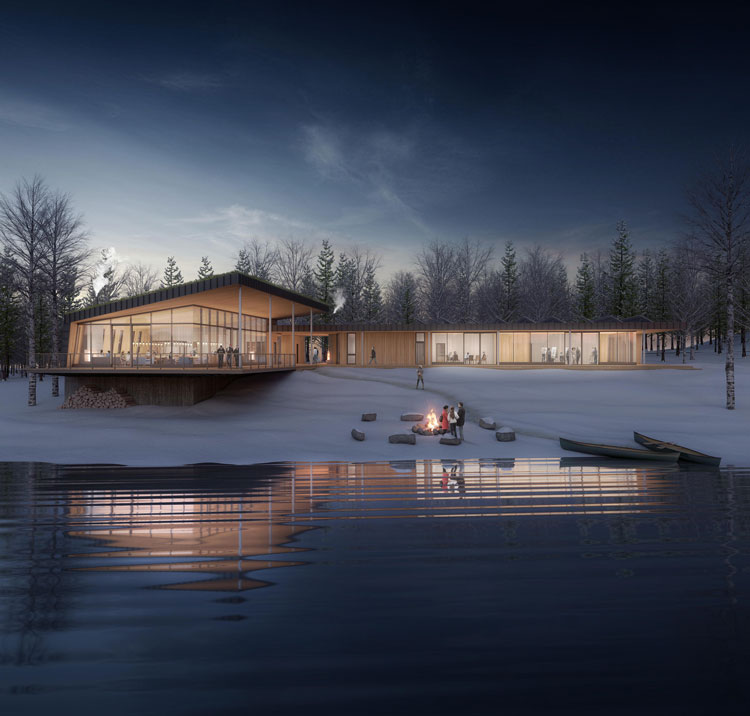Renewed Vision
A renewed vision for the University of Saskatchewan’s Emma Lake Kenderdine Campus
What if there were a way to create a place – a beautiful, land-based, creative place – where disparate and often conflicting world views could be brought together for the benefit of humankind?
What if there were a place that could honour and bridge the old ways of knowing and the new … the artistic and scientific … the Indigenous and the Western? A place that, through its structures and presence, provided the physical and creative platform for vital, mindful discussions and initiatives that led to new ideas about the world’s greatest challenges – ideas that the world needs?
The University of Saskatchewan’s Emma Lake Kenderdine Campus can be that place.
ELK Campus for Creativity, Collaboration, and Reconciliation

Resting on the edge of Emma Lake and tucked into the expansive boreal forest, the 28-acre site provides for the University of Saskatchewan an unparalleled opportunity to design a creative, land-based, peaceful place for gathering, learning, and Reconciliation. Just a half-hour’s drive north of the university’s new Prince Albert campus, it adds to the university’s unparalleled capability to bring together critical thinking and creative activity across genres.
The campus, founded in 1932 and long seen as a site of artistic collaboration, was taken offline 2012, providing an opportunity to re-envision what the campus could be. The intervening years have made clear the benefits to the university, the community, and society if the campus could remain firmly committed to its creative roots while broadening its purpose.
Now, we envision it as a gathering place
where collaborative thinking, interdisciplinary approaches, and creative mindsets intersect;
where various economic, political, cultural, academic and other viewpoints are expressed and encouraged
where great and thoughtful discussions lead to new ways of looking at the world around us, contributing to both healing and growing.

As the home of a centre devoted to creative collaboration, it can support the university’s stated commitment to problem-solving and Reconciliation while honouring the creative and collaborative artistic viewpoints so essential to building understanding and advancing learning. As a place where a challenge, an issue, or an idea can be examined through various lenses – the lenses of artists of various disciplines, scientists of various areas of emphasis; humanists; Indigenous scholars, elders, young people, public intellectuals; political leaders, corporate leaders, so many more – it can contribute to our future as a global society. Here, diverse ways of learning and expression can launch new forms of discovery.
When people gather on the campus, great things can happen. Through meetings, courses, forums, roundtables, and visionary discussions, through guided and reflective discourse, common ground can emerge from conflict; from a cacophony of ideas can come harmony and understanding and, importantly, a way forward. Here can be a place of commitment to action that ensures a global future that grows from the Canadian commitment to and understanding of the land on which we live – a land that nurtures us all.
Drivers of Success
Five drivers of success underpin the development of a campus that meets this potential:
- We seek a campus that can be open year-round.
- We envision a campus that is by design driven by community-based partnerships.
- We are committed to a model that is financially sustainable decades into the future.
- We require a campus that is academically sustained and engaged.
- We imagine a campus that benefits people from throughout Saskatchewan, across Canada, and around the world.
With those drivers in place, we envision:
- A campus known throughout western Canada and beyond as a year-round gathering place conducive to thoughtful discussion, active learning, and the inspired collision of diverse ideas, accessed by diverse peoples and organizations eager to understand, engage, and grow.
- A campus that, through academic engagement and partnership, advances the aspirations of the people of the province and beyond through interdisciplinary, collaborative approaches to discovery, teaching, preserving and applying knowledge.
- A campus that, through community-based programming, events, and learning opportunities, serves as a pathway for both traditional and non-traditional learners, some of whom may wish to move into the post-secondary system to build on what they discover.
- A campus that serves as the heart and home of a Centre for Reconciliation, supporting active and goal-oriented discussions and initiatives that advance reconciliation and bridge ways of knowing, contributing to the health of our communities.
- A campus where learners of all ages and stages of learning are inspired in a setting meant to focus their thoughts on the larger world in which they are placed.
- A campus that serves as a hub for land-based, inspired creative and artistic expression that is informed by the boreal setting.
- A campus that offers neutral ground for people of all backgrounds and mindsets to talk with each other, learn from each other, and respect one another – where various conversations, supported by various organizations and institutions, can be held in an open setting conducive to solutions.
- A campus that brings together leaders in corporate and non-profit groups across Canada in a private, open setting conducive to critical discussions that advance their organizations and their communities.
Once this picture is realized, the campus’ 28 acres will be home to permanent and year-round gathering, working, reflection, and learning spaces, as well as housing and dining services. It will effectively bridge the campus’ storied past with the university’s stated intent to be the University the World Needs.
ELKC Survey
Your voice will help shape our way forward, so we encourage you to take the time and tell us how and where do you see yourselves in the concept?
In the news
Jun 1, 2020 - USask News
USask cabin donation addresses housing crisis, continues preparation for new Kenderdine Campus vision
May 25, 2020
Letter to Stakeholders

